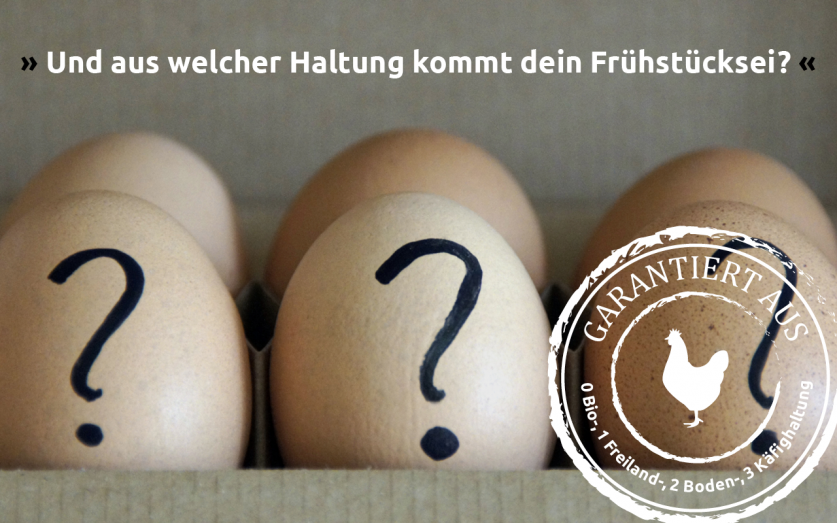Gespeichert von dilemma am

Animal welfare or cruelty? – It is our decision
I chose this topic because it is an existing dilemma situation in our daily life and we are often faced with the choice, if money or animal welfare is more important for us. It is a decision between moral and greed. The image should encourage people to reflect on their actions and lead to a rethinking.
Prices of hen’s eggs are on the decrease and in some of the discounters you get ten for 99 cent. In order to establish themselves on the market the producers are forced to reduce their production costs. The consumer appreciates those bargains but the animals are the ones, which suffer from such dumping prices.
When we are standing in front of a shelf in a supermarket we can chose between several eggs of different types. For example the number 0, which stands for organic egg production, 1 = free range eggs, 2 = deep litter/indoor housing and 3 = battery cage farming. Although many of us know exactly what every classification means people often chose the cheaper product instead of the more expensive one, which guarantees the standards of treatment and care of the animals. So the dilemma situation is clearly visible: it is not possible to buy a cheap product on the one hand and support animal welfare on the other hand. One should always be aware there is a reason why cheap products are cheap. In general they go on the expenses of animal welfare.
Battery cages in the EU are forbidden since 2012 therefore supermarkets sell deep litter eggs and many people think those are better. But the fact is the animals do not have more space than those, which are kept in cages.
To sum up we have to know it is never possible to buy cheap eggs and support appropriate animal husbandry. It is necessary to open our eyes and understand that our buying behaviour is able to control supply. The consumer is the one, who has the opportunity to change the existing situation on the market. If people do not buy eggs produced by factory farming farmers are forced to overthink and finally change their method of production. It is up to us if we want to accept cruelty to animals or buy welfare-friendly products of happy chickens. We are able to buy two things, if we chose the more expensive goods: a good conscience as well as a happier life of the animals.
Stephanie Haemmerle
Sources:
http://www.sueddeutsche.de/wirtschaft/marktmacht-der-discounter-der-hohe...
http://www.faz.net/aktuell/wirtschaft/unternehmen/preissenkungen-bei-ald...
Album:
Dilemma Situation
Dilemma Situationen, erarbeitet von InterMedia Studierenden an der FH Vorarlberg in der Lehrveranstaltung Medienethik.


